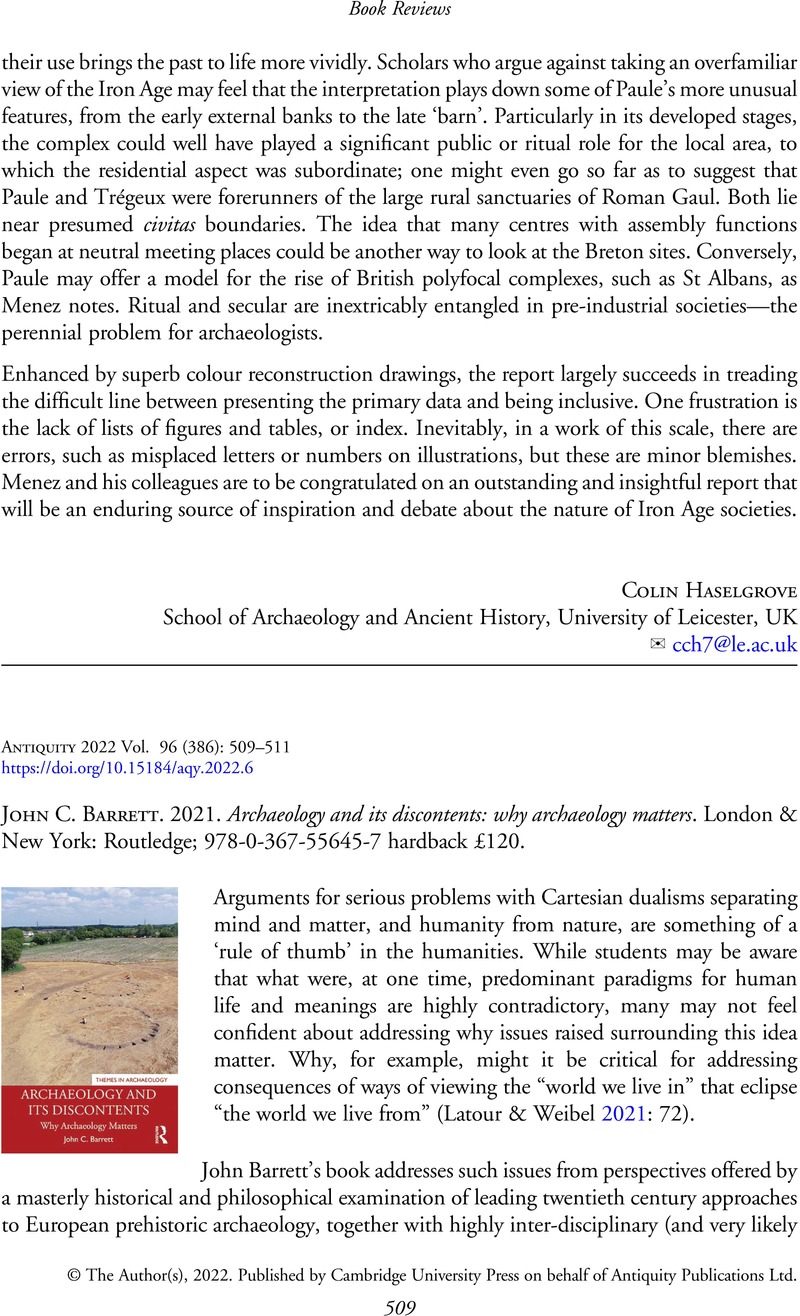No CrossRef data available.
Article contents
John C. Barrett. 2021. Archaeology and its discontents: why archaeology matters. London & New York: Routledge; 978-0-367-55645-7 hardback £120.
Review products
John C. Barrett. 2021. Archaeology and its discontents: why archaeology matters. London & New York: Routledge; 978-0-367-55645-7 hardback £120.
Published online by Cambridge University Press: 03 February 2022
Abstract
An abstract is not available for this content so a preview has been provided. Please use the Get access link above for information on how to access this content.

- Type
- Book Reviews
- Information
- Copyright
- Copyright © The Author(s), 2022. Published by Cambridge University Press on behalf of Antiquity Publications Ltd.
References
Barrett, J.C. 1994. Fragments from antiquity: an archaeology of social life in Britain, 2900–1200 BC. Oxford: Blackwell.Google Scholar
Clarke, D. 1973. Archaeology: the loss of innocence. Antiquity 47: 6–18. https://doi.org/10.1017/S0003598X0003461XCrossRefGoogle Scholar
Freud, S. 1949 [1929]. Civilization and its discontents. Translated by Rivier, J.. London: Hogarth.Google Scholar
Kauffman, S.A. 1993. The origins of order: self-organisation and selection in evolution. Oxford: Oxford University Press. https://doi.org/10.1007/978-94-015-8054-0_8Google Scholar
Kauffman, S.A. 2019. A world beyond physics: the emergence and evolution of life. Oxford: Oxford University Press.Google Scholar
Latour, B. 2004. Whose cosmos? Which cosmopolitics? Common Knowledge 10: 450–62. https://doi.org/10.1215/0961754X-10-3-450CrossRefGoogle Scholar
Latour, B. 2005. Reassembling the social: an introduction to actor network theory. Oxford: Oxford University Press.Google Scholar
Latour, B. & Weibel, P. (ed.). 2021. Critical zones: the politics and science of landing on Earth. Cambridge (MA): MIT Press.Google Scholar
Malafouris, L. 2007. Before and beyond representation: towards an enactive conception of the Paleolithic image, in Renfrew, C. & Moreley, I. (ed.) Image and imagination: a global prehistory of figurative representation: 287–300. Oxford: Oxbow.Google Scholar
Malafouris, L. 2013. How things shape the mind: a theory of material engagement. Cambridge (MA): MIT Press.CrossRefGoogle Scholar
Margulis, L. 1998. The symbolic planet: a look at evolution. London: Weidenfeld & Nicolson.Google Scholar
Margulis, L. & Sagen, D.. 2002. Acquiring genomics: a theory of the origins of species. New York: Basic Books.Google Scholar
Nietzsche, F. 2002 [1886]. Beyond good and evil. Translated by Norman, J.. Cambridge: Cambridge University Press. https://doi.org/10.1017/CBO9780511812033Google Scholar
Nietzsche, F. 2007 [1887]. On the genealogy of morality. Translated by Diethe, Carol. Cambridge: Cambridge University Press.Google Scholar
Wittgenstein, L. 1922. Tractatus logico-philosophicus. Translated by Ogden, C.K.. London: Kegan Paul.Google Scholar




